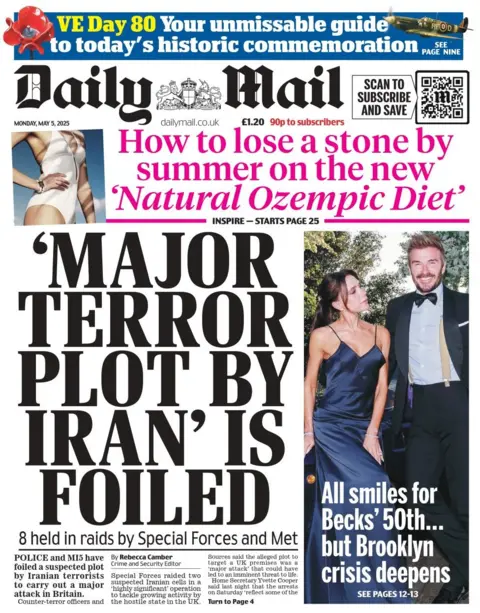The recent foiling of a significant terror plot has dominated the headlines, marking a critical moment in national security discussions. According to reports featured prominently in various publications, operations led by counter-terrorism police across England have resulted in the arrest of eight individuals as part of two separate investigations. These raids reportedly targeted a plot that was being described as a “major attack” with the potential for imminent threat to life, particularly focusing on locations associated with the Jewish community.
In a detailed report by the Daily Mail, the newspaper describes these operations as vital preventive measures, emphasizing the gravity of the threat before it was successfully neutralized. The arrests, which included seven Iranian nationals, have sparked renewed discussions in the UK Parliament about the potential designation of Iran’s Islamic Revolutionary Guard Corps as a terrorist organization. This move had previously been resisted by the government due to concerns that it would sever back-channel communications with Iran.
In parallel, the Daily Telegraph indicates that institutions within the British government have been assessing the implications of this foiled attack and the public’s growing concern over domestic terrorism. The Telegraph mentions that many experts speculate the targeted establishment may have been a synagogue or another significant Jewish site, contributing to heightened alarm within the community.
Simultaneously, the fallout from last week’s local elections is evident in the political landscape. The Times is reporting that following disappointing results, the Conservative Party, led by Kemi Badenoch, faces internal pressures to reconsider its strategies. Daily commentary highlights calls for Labour leader Sir Keir Starmer to avoid knee-jerk reactions to shifting political tides, particularly after the success of the Reform UK party in the recent elections. Some urging this caution include former Transport Secretary Louise Haigh, who suggested that fundamental changes in tax policies may be necessary for Labour to reconnect with voters.
In a different segment, the Guardian discusses previous assertions from Starmer regarding the need for improved UK-EU relations in the context of police and migration database access post-Brexit. His advocacy for accessing European crime databases was met with a firm rejection from EU officials, which the Times later corroborates as a setback for the UK government’s plans to enhance security cooperation.
The cultural impact of these events is not overlooked, with parallel national conversations ranging from VE Day commemorations, as featured in the Daily Mirror, highlighting the remembrance of fallen veterans, to entertainment news surrounding David Beckham’s recent 50th birthday celebrations. The festivities reportedly faced disruptions due to noise complaints from nearby residents, resulting in an early end to the party, drawing mixed reactions from the media.
The Daily Express, meanwhile, showcases a powerful plea from a Ukrainian veteran, who implored the UK to maintain its support amid ongoing conflict with Russia, reinforcing the importance of international solidarity.
In summation, as these narratives unfold across various media channels, they reveal a landscape where national security, political maneuvering, public sentiment, and cultural remembrance intersect. Each outlet contributes to the broader understanding of how these interconnected issues shape both immediate responses and long-term strategies within the UK.



